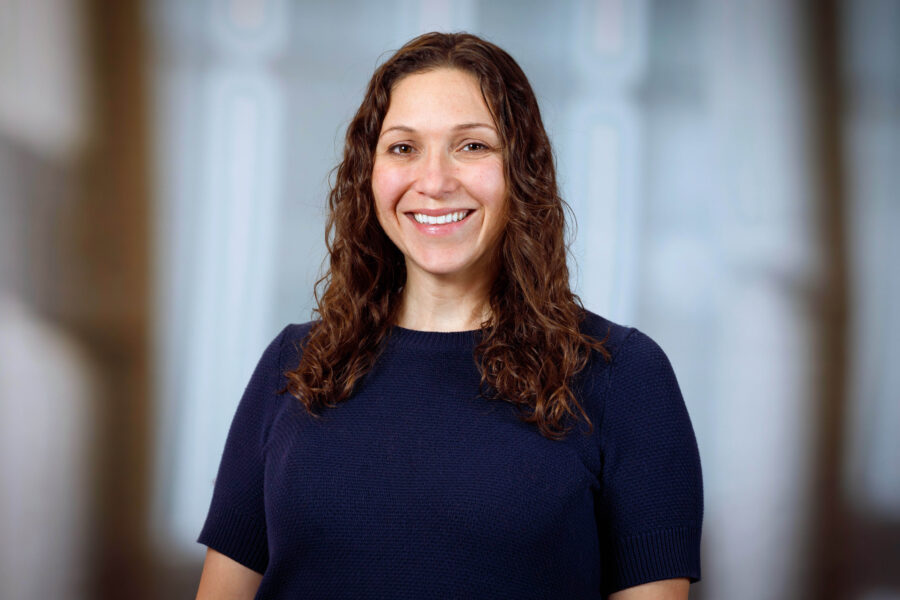Tara Fahmie, PhD, the new director of the MMI Department of Severe Behavior, is ready to make a difference.
Dr. Fahmie joined MMI in 2019 as the associate director of the department, coming from California State University Northridge in Los Angeles, where she had spent nine years as a faculty member.
“It was a big career move for me, because I was coming from a heavy teaching position to a much heavier clinical position here,” she said.
MMI was a perfect fit, though, because of Dr. Fahmie’s deep interest in severe and challenging behaviors. And once she arrived, she found other positives – many of which played into her decision to seek the director’s role when it became open in 2024.
“The biggest component is the talented team,” she said. “I’ve never seen a group of more talented people when it comes to severe behavior all in one place. “I really enjoy working with the staff here, and I feel a high level of mutual respect for them. There are a lot of opportunities here for a leader with such a great group in place.”
Dr. Fahmie can pinpoint the moment when her passion for working with individuals with severe behaviors solidified. She was an undergraduate psychology major at the University of Florida, and she began working in an Applied Behavior Analysis research lab – an area she knew nothing about at the time. She providentially began working with Brian Iwata, PhD, a nationally known severe behavior researcher and educator and a man Dr. Fahmie calls a “game changer for the area of severe challenging behavior.”
Working in Dr. Iwata’s lab proved a game changer for Dr. Fahmie, as well. As she watched graduate students working with children and adolescents who were engaging in severe, self-injurious and aggressive behaviors, she was struck by the impact they were having.
“I thought that challenging behavior would be something internally driven, too complicated for anybody outside of a brain specialist to be able to manage,” she said. “When I saw the impact of the behavioral approach to severe challenging behavior, I was blown away.
That approach is now standard when helping kids with severe challenging behavior: teaching children how to communicate their needs or wants, “so that they don’t have to use challenging behavior to get those needs met,” she said.
“We basically teach people ways to communicate and navigate challenges they will experience in life. Watching the process of learning, and watching a child go from hundreds or thousands of occurrences of self-harming behavior a day to being able to communicate, ‘I need attention’ and seeing the self-harm decrease to near zero, I am constantly reminded — This is an incredible field. This is an incredible approach.”
As she takes on the director’s role at MMI, Dr. Fahmie has clear goals for the department.
“I’d like to expand and enhance our clinical services,” she said. “Of course, since I got here, the department and institute leadership continuously has worked to improve, serve our families and help our children achieve their best outcomes. It’s been an inspiring place to work.”
The department currently has 16 treatment rooms, and one goal for Dr. Fahmie is to increase the number of clients seen. Another is to continue to expand the department’s partnerships with local school districts. And she’d also like to explore expanded collaborations with other MMI departments, such as psychology and early intervention.
“There are ways that the severe behavior department can support other departments, even with patients that don’t necessarily meet the qualifications to get a full admission in our department,” she said. “They might have challenging behavior, not quite at a severe level, that is nevertheless prohibiting them from accessing other services. We would be able to provide some additional support for them to access those services.”
In announcing Dr. Fahmie’s appointment, MMI Director Karoly Mirnics, MD, PhD, expressed excitement in the direction she would take the department.
“Tara is a dedicated, hard worker, who deeply cares about our patients, faculty and staff and the enterprise,” Dr. Mirnics said. “She is extremely bright, always with a smile and positive attitude. Overall, she is an amazing leader and a wonderful human being.”
